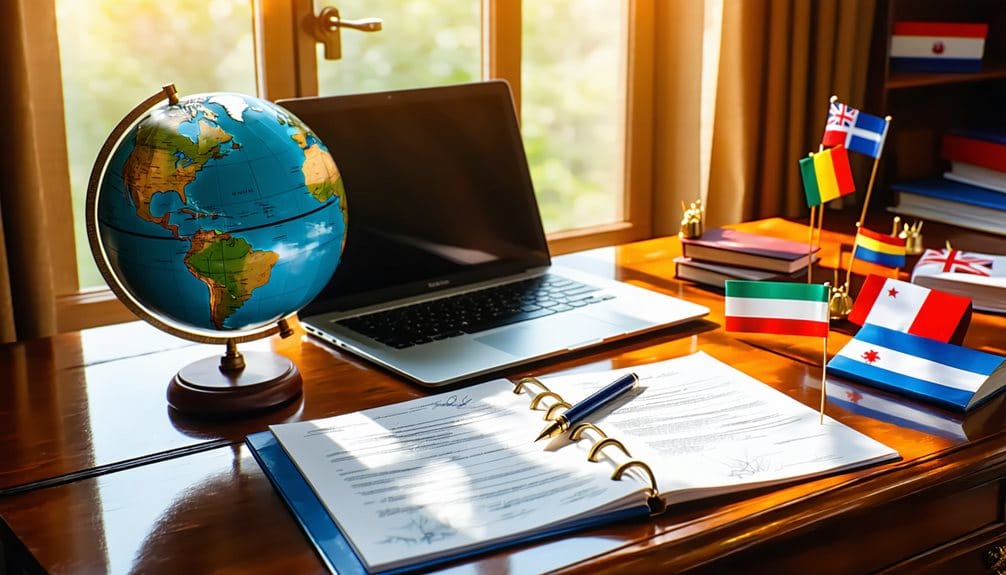Estate planning is about more than wills and inheritance. A binding financial agreement (BFA) can act as a planning [...]
Comprehensive Guide to Navigating International Child Custody Disputes
Navigating international custody disputes might feel like trying to solve a puzzle with pieces from different sets. The laws vary from country to country, which can be daunting.
But don’t worry! The Hague Convention is your go-to for addressing child abduction issues, keeping the child’s best interests at heart. Think of it as your compass, guiding you through the murky waters.
Crafting detailed custody agreements is crucial. Mediation can be a friendly way to sort out disagreements. Always get professional legal advice—it’s like having a seasoned captain on your ship, ensuring effective negotiation and timely action.
Remember, the focus should always be on the child’s wellbeing.
By understanding these key elements, you’ll gain insight into resolving these complex issues. It’s a bit like mastering a challenging game—once you know the rules and strategies, you’re on your way to success!
Introduction
You’re about to explore the intricate world of international child custody disputes, where differing legal systems and emotional stakes add layers of complexity. These disputes often emerge when parents live in separate countries or when one wants to relocate abroad with their child. Understanding these common scenarios is key to manoeuvring the challenges and protecting your child’s best interests.
Overview of International Child Custody Disputes
Handling international child custody disputes can be intimidating, especially when parents hail from different countries, adding layers of complexity to custody arrangements. Understanding the legal landscape is vital. The Hague Convention provides a legal framework for the prompt return of abducted children to their habitual residence. This guarantees the best interests of the child are considered, aiding parents involved in international disputes to navigate effectively.
Common Scenarios Leading to Disputes
International child custody disputes present unique challenges, often rooted in specific scenarios that escalate tensions between parents. Disagreements over child custody agreements and international parental child abduction arise when one parent relocates abroad without consent. Different legal systems complicate custody battles, especially regarding the child’s habitual residence. Disputes also occur over travel arrangements and family law and international cases, impacting international child custody cases considerably.
Understanding International Child Custody Disputes
When you’re dealing with international child custody disputes, it’s important to recognise the complexities involved in manoeuvring multiple legal systems. Key elements in these cases include understanding jurisdictional issues and the enforcement of custody orders, which can be particularly challenging with non-signatory countries. As a parent, you’ll face obstacles such as differing laws and the urgency of legal action, but knowing your rights under agreements like the Hague Convention can help protect your child’s best interests.
What Are International Child Custody Disputes?
Managing international child custody disputes can be challenging due to the complexity of differing legal systems and jurisdictions. These disputes arise when parents involved in international settings disagree over custody, often complicating matters. The Hague Convention, an abduction is an international treaty, offers a legal framework for the prompt return of their child to the child’s habitual residence. It’s essential to consult an experienced family lawyer, especially if not all parties are signatory to the Hague Convention.
Key Elements of International Custody Cases
Navigating the intricacies of international custody cases requires a clear understanding of key elements that can influence the outcome. Begin by recognising that child custody arrangements often hinge on legal procedures and jurisdiction over the custody. In international child custody disputes, the child’s habitual residence is critical. If child abduction is an international concern, the Hague Convention on International Child Abduction can aid resolution. Consult an experienced family lawyer.
Challenges Faced by Families
Maneuvering international child custody disputes can be intimidating for families, as they often involve cross-border legal challenges and emotional turmoil. You’ll face legal battles over custody orders across international borders and the risk of international abduction by a parent. Engaging an experienced family lawyer is crucial for understanding the legal framework. Prioritising the child’s habitual residence, rights, and best interests guarantees informed decisions in these complex situations.
The Hague Convention: A Crucial Framework
You’ll find the Hague Convention on the Civil Aspects of International Child Abduction is a pivotal framework designed to address the wrongful removal or retention of children across borders. By understanding its key provisions, like determining jurisdiction and habitual residence, you’ll be equipped to navigate these challenging situations. If your child is abducted internationally, knowing the steps to initiate their return can be essential in ensuring swift action.
What is the Hague Convention on the Civil Aspects of International Child Abduction?
The Hague Convention on the Civil Aspects of International Child Abduction is a pivotal international treaty that addresses the complex issue of children wrongfully removed or retained across borders. By establishing a legal framework, it aims to protect children and secure their prompt return to their habitual residence. With over 90 signatory countries, the Convention prioritises the best interests of the child in international abduction cases.
Key Provisions of the Hague Convention
Understanding the key provisions of the Hague Convention is essential for managing international custody disputes effectively. This legal framework for returning a child to another country guarantees they’re promptly returned to their home country, protecting children from international abduction. It focuses on the child’s habitual residence and mandates cooperation among signatory countries. The Convention empowers you to navigate complex custody cases with confidence and clarity.
Determining Jurisdiction and Habitual Residence
Manoeuvring through international custody disputes requires grasping the principles outlined in the Hague Convention, especially the concept of habitual residence. This legal framework helps determine jurisdiction by identifying a child’s habitual residence, essential for custody decisions. By ensuring the prompt return of abducted children, it discourages wrongful removal. For parents from different countries, understanding this framework is critical for manoeuvring the complexities of international child custody disputes efficiently.
Steps to Take if Your Child is Abducted Internationally
When your child is abducted internationally, the Hague Convention becomes an essential tool for securing their swift return. Understanding the legal framework for returning abducted children is vital. The first step in resolving international child custody disputes requires filing an application with the Central Authority. Experienced family lawyers can guide you through your child’s habitual residence specifics, ensuring your case aligns with the Convention’s requirements for success.
Crafting Effective International Custody Agreements
When crafting an effective international custody agreement, you should focus on building a strong custody order that incorporates detailed provisions for overseas travel. Clearly outline travel plans and guarantee both parents consent to avoid misunderstandings. Consider using mediation to resolve disputes amicably, keeping the child’s best interests at the forefront.
Building a Strong Custody Order
Crafting effective international custody agreements demands careful attention to detail and foresight. Engage a family lawyer experienced in international matters to navigate custody orders across borders. This professional will guarantee compliance with the international treaty that aims to protect children. Establish the child’s habitual residence and outline dispute resolution measures. A robust order considers the child’s best interests, particularly if relocating a child to Australia.
Incorporating Overseas Travel into Custody Plans
Incorporating overseas travel into custody plans requires foresight and detailed planning to prevent future conflicts. Consult a solicitor who specialises in international family law for legal insights when dealing with international arrangements. If you brought your child to Australia or have a child from Australia, guarantee Consent Orders are in place. A neutral third party can help negotiate agreements in complex international cases, safeguarding your child’s best interests.
Using Mediation to Resolve Disputes
Mediation emerges as an invaluable tool in resolving international custody disputes, offering a path that prioritises collaboration over conflict. Disputes often arise when a child objects to being returned to their habitual residence. Through Family Dispute Resolution, you can craft amicable agreements and establish a framework for returning, ensuring the best interests of their children are met. Mediation allows for flexible, tailored solutions beyond rigid court orders.
Legal Frameworks Governing International Custody
When you’re dealing with international custody disputes, understanding the legal frameworks across different borders is essential. International treaties like the Hague Convention play a significant role in guiding these cases by promoting cooperation and ensuring the swift return of abducted children. Engaging specialised legal counsel can help you navigate these complex systems and advocate effectively for your child’s best interests.
Family Law Across Borders
Maneuvering the complex terrain of international custody disputes requires a thorough understanding of the legal frameworks that span across borders. The Hague Convention provides a legal framework, ensuring a child must return to their habitual residence. This treaty aims to protect children across international borders, often requiring cooperation from convention countries. Countries that are signatories adhere to protocols, facilitating resolution in such disputes.
The Role of International Treaties
Although the complexities of international custody disputes can seem overwhelming, international treaties offer a structured legal framework to address these challenges. The Hague Convention facilitates the prompt return of children wrongfully removed across borders, prioritising their best interests. With over 90 signatory countries, it guarantees cooperation without legal fees. However, non-signatory countries like Japan complicate enforcement, highlighting the importance of understanding these critical agreements.
Engaging Specialized Legal Counsel
Maneuvering international custody disputes requires specialised legal counsel due to the intricate legal frameworks that vary across jurisdictions. You need experts in international family law who can navigate treaties like the Hague Convention, ensuring the swift return of abducted children. These solicitors grasp the nuances of family and migration law, providing essential guidance and timely intervention to protect your child’s best interests and achieve favourable outcomes.
Resolving International Custody Disputes
When facing international custody disputes, you should prioritise seeking professional legal help to navigate the complexities of international law. Working with international law experts can provide invaluable guidance, ensuring you understand your rights and obligations. Always focus on the child’s best interests, as courts consider factors like emotional well-being and maintaining meaningful relationships with both parents.
Seeking Professional Legal Help
Navigating the complexities of international custody disputes requires seeking professional legal help. An experienced family lawyer provides essential guidance under the Hague Convention, ensuring you understand your rights and obligations. Quick legal action is vital, as delays can affect your child’s well-being. Legal experts assist in negotiating Consent Orders and engaging in family dispute resolution, prioritising your child’s best interests and fostering cooperative co-parenting.
Working with International Law Experts
Maneuvering international custody disputes demands a strategic approach, and collaborating with international law experts can be essential. They guide you through the Hague Convention’s provisions, ensuring the swift return of abducted children. Their expertise in family and migration law helps when relocation impacts custody. Drafting Consent Orders with their assistance reduces disputes. Timely intervention by specialists profoundly influences outcomes in cross-border custody cases.
Prioritising the Child’s Best Interests
In the intricate landscape of international custody disputes, focusing on the child’s best interests stands as the guiding principle. You’ll need to evaluate factors like the child’s relationship with both parents, emotional well-being, and opinions. Ascertain compliance with the Hague Convention to prevent abduction. Aim for mediation to resolve conflicts smoothly, minimising distress and promoting stability in the child’s habitual residence and parental relationships.
Conclusion
You’ve learnt that understanding international custody disputes involves traversing complex legal systems and prioritising your child’s best interests. To support your journey, explore additional resources that offer guidance on international family law and the Hague Convention. Staying informed empowers you to make decisions that protect your rights and your children’s well-being.
Key Takeaways
Navigating international custody disputes requires a solid understanding of complex legal frameworks, like the Hague Convention, which guarantees the swift return of abducted children to their habitual residence. Written consent for travel is essential. Act promptly if a child isn’t returned. Mediate disputes to prioritise children’s well-being. Consulting an experienced lawyer guarantees you’re effectively navigating legal intricacies and advocating for your child’s best interests.
Additional Resources for Parents
Although managing international custody disputes can be intimidating, especially with differing legal systems at play, there are valuable resources to assist you in this journey. Familiarise yourself with the Hague Convention and consider mediation or Family Dispute Resolution to settle matters amicably. Always document travel plans with written consent. Seek experienced legal counsel promptly if issues arise, ensuring you’re well-prepared to advocate for your child’s best interests.






























